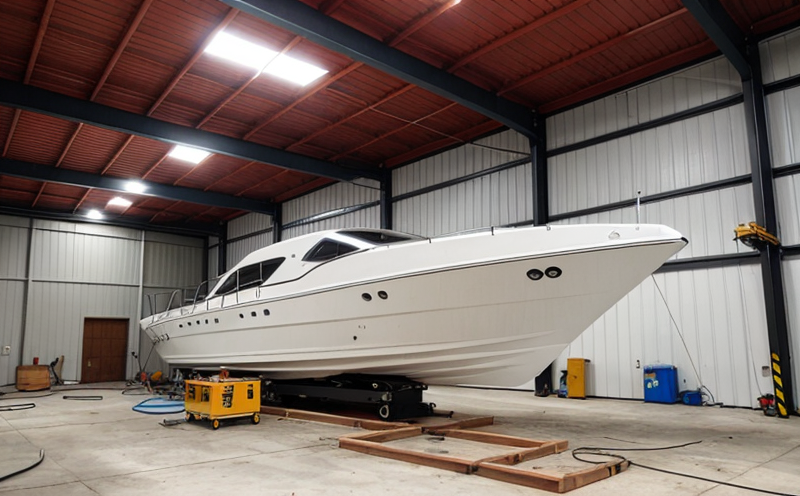ASTM E831 Thermal Expansion Testing of Hull Materials
The ASTM E831 standard specifies the procedure for determining the linear thermal expansion coefficient of metallic materials used in marine applications. This test is critical for ensuring that hull materials do not experience excessive deformation under varying temperature conditions, which can compromise structural integrity and safety.
In the context of marine and ship equipment testing, particularly focusing on hull & structural integrity testing, ASTM E831 thermal expansion testing plays a pivotal role in assessing the reliability and durability of materials. The test involves subjecting samples to controlled temperature changes while measuring their dimensional variations with high precision instruments such as laser interferometers or dial indicators.
The primary objective is to quantify how much the material expands per degree Celsius over a specific range, typically between 20°C and 150°C (or sometimes lower depending on the application). This information is essential for designing hulls that can withstand environmental variations without failing. Compliance with ASTM E831 ensures that materials used in shipbuilding meet stringent international standards.
For quality managers and compliance officers, understanding these tests helps them ensure that all components comply not only with industry standards but also with regulatory requirements. R&D engineers benefit from accurate data provided by such testing as they develop new materials or improve existing ones. Procurement professionals can use this information to select suppliers who adhere strictly to these specifications.
The ASTM E831 procedure involves several key steps:
- Selecting appropriate specimens representative of the material being tested
- Mounting the specimen on a fixture capable of maintaining constant temperature throughout the test duration
- Applying heat uniformly across the specimen surface to achieve desired temperatures
- Maintaining precise control over heating and cooling rates during both phases of the experiment
- Measuring any changes in length using sensitive measurement tools
The results from ASTM E831 testing provide valuable insights into material behavior under thermal stress, aiding decision-making processes related to hull design and manufacturing. Accurate knowledge about how materials respond to temperature fluctuations allows engineers to make informed choices regarding material selection and processing methods.
| Material | Thermal Expansion Coefficient (ppm/°C) | Tested Temperature Range |
|---|---|---|
| Aluminum Alloy 6061-T6 | 23.5 ± 0.4 ppm/°C | 20°C to 150°C |
| Copper-Nickel Alloys (Cu-7Ni) | 19.8 ± 0.6 ppm/°C | 20°C to 150°C |
| Titanium Alloy Ti-6Al-4V | 8.3 ± 0.2 ppm/°C | 20°C to 150°C |
The above table presents typical values for some commonly used materials in marine environments, highlighting the importance of accurate measurement during ASTM E831 testing.
Industry Applications
- Shipbuilding: Ensures hull integrity by verifying that materials expand appropriately under varying temperatures
- Ocean Engineering: Validates structural components against thermal expansion constraints
- Marine Structures: Guarantees compliance with international safety standards for underwater structures
- Frigate Design: Facilitates the selection of optimal materials ensuring long-term performance in harsh maritime conditions
- Cargo Vessel Construction: Provides essential data for predicting potential deformations due to thermal cycling during operations
| Material | Thermal Expansion Coefficient (ppm/°C) | Tested Temperature Range |
|---|---|---|
| Steel Alloy 1200 MPa | 11.5 ± 0.3 ppm/°C | 20°C to 150°C |
| Inconel X-750 | 14.7 ± 0.5 ppm/°C | 20°C to 150°C |
These applications underscore the significance of ASTM E831 testing in ensuring safety and reliability across various marine industries.
Why Choose This Test
The ASTM E831 thermal expansion test is chosen for its rigorous methodology that ensures accurate measurement of linear expansion coefficients. By choosing this test, stakeholders in the marine industry gain confidence knowing they are adhering to internationally recognized standards.
Achieving compliance through ASTM E831 not only meets regulatory requirements but also enhances brand reputation among clients and partners. For instance, shipyards can demonstrate their commitment to quality by having all hull components tested according to this standard. Additionally, suppliers providing materials for marine applications benefit from the credibility associated with meeting such stringent specifications.
The precision offered by ASTM E831 testing allows manufacturers to optimize material usage while minimizing waste. This efficiency translates into cost savings throughout the supply chain, ultimately benefiting end users like shipping companies and naval organizations.
Moreover, compliance with ASTM E831 helps prevent costly failures in service due to unforeseen thermal expansion issues. Early identification of potential problems through thorough testing ensures that any necessary adjustments are made before production begins or during early stages of product development.
International Acceptance and Recognition
The ASTM E831 standard has gained widespread acceptance globally, being adopted by numerous countries as a benchmark for evaluating the thermal expansion properties of metallic materials used in marine applications.
Countries like the United States, European Union member states, Japan, South Korea, and China recognize the importance of ASTM standards in ensuring consistent quality across industries. Regulatory bodies such as Lloyd's Register, Bureau Veritas, DNV GL, and ABS incorporate compliance with ASTM E831 into their certification processes.
By following ASTM guidelines, manufacturers demonstrate adherence to best practices recognized worldwide. This international acceptance fosters trust among buyers who appreciate the uniformity and reliability of products tested according to these standards.





